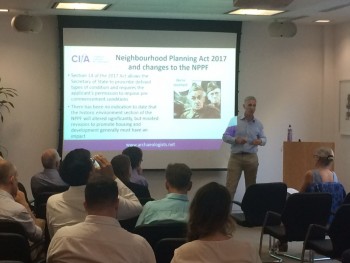On 5 July, RTPI London ran an inter-professional event with the Chartered Institute for Archaeology (CIfA), kindly hosted by Jones Lang LaSalle on heritage, planning and development. This event focused on the heritage challenges and opportunities in London development projects and the benefits of considering heritage aspects at the outset of a project and consulting experts in heritage.
Tim Howard who is CIfA’s Senior Policy Advisor and is responsible for advising on the development of CIfA policy introduced and chaired the event. He outlined the potential challenges in managing heritage assets, particularly a lack of resources to deal with complex applications, deregulation and site designations that do not adequately consider any potential archaeological remains. He stressed the need for these issues to be considered at the outset of a development project and recommended caveats are attached to prevent any important historic resources from being lost.
Our first speaker for the evening was David McDonald who is a heritage consultant and is President of the Institute of Historic Building Conservation (IHBC). He was previously the Conservation and Design Team Leader at the Royal Borough Kensington (RBKC) where he worked for over twenty years. David spoke about the harmful loss of non-designated heritage assets, which have significance (such as being associated with a historic figurehead) and/or character (where a building forms part of the quality of a place), making specific reference to some pub appeals he was successful in winning whilst working at RBKC. He also touched on the difference between the obligations within the NPPF and the statutory tests contained within the legislation, he said it is important for practitioners to consider the requirements of both when dealing with an application involving heritage assets.
The second speaker was Sandy Kidd who is principal archaeologist at the Greater London Archaeological Advisory Service at Historic England. Sandy outlined the special challenges of working within London where a substantial proportion of land is or archaeological interest. He stressed the importance of engaging communities in heritage, as an example by opening up sites of interest to members of the public during the construction period. He said this had been particularly successful at the Curtain Theatre site in London where the archaeological remains form a key component of the identity and offering of this development site.
Our third speaker of the evening was Josie Murray, heritage consultant for High Speed One, who and has been closely involved in the redevelopment of St Pancras International Station. Josie said that the heritage significance of this station was instrumental in delivering a rail station of international importance. She discussed the complex legislation that governed the re-development of this station, which include the 1996 Channel Tunnel Rail Link Act. She said continuous collaborative working with Camden Council has been essential in delivering this project in a timely manner and highlighted the benefits of engaging key stakeholders early on in the process.
The final speaker from the evening was Janet Miller, CEO of the Museum of London Archaeology (MOLA). Janet highlighted how heritage assets can enrich place design and add identity and value. She discussed some of the ways that MOLA has been engaging and inciting interest in heritage assets within communities which include a ‘time truck’ and recruiting local volunteers. She said that heritage assets need not be viewed as a defining constraint and can be used positively in a proposal, as an example at Guild Hall, London where the archaeology is reflected in the surface treatment and forms part of the streetscape.
Drinks, nibbles and networking provided by our host followed the talks. RTPI London and CIfA would like to thank JLL for sponsoring this event.
CIfA and RTPI continue to work closely together and more information about future events and other initiatives will be posted here.


